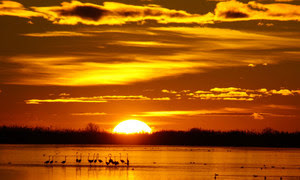by Sébastien Duyck on 18th September 2019
A ‘people’s summit’ in New York ahead of the official UN climate summit brings environmental and human-rights campaigners together in pursuit of climate justice.Today, the international human rights community and the international environmental community unite in New York city ahead of the United Nations Climate Action Summit. It is the latest, critical step in broadening the climate-justice movement to include the voices of groups at the forefront of human rights struggles.
The People’s Summit on Climate, Rights, and Human Survival brings together representatives of indigenous peoples, workers, youth, women, and environmental and human rights groups to unite behind collective goals to advance climate justice. Joined by millions around the world and echoing the calls of UN human-rights institutions, participants are demanding governments and corporations urgently address the climate crisis to ensure human survival.
The impacts of the climate crisis can no longer be ignored. People across every time zone are defending their right to a safe climate and sustainable future. Youth are striking from school. Religious leaders are calling for the protection of our natural world. Cities, states and citizens are suing governments and corporations for (in)action.
Root causes
Once perceived as solely an environmental concern, climate change is, at its core, a human-rights issue. Indeed, the root causes of the climate crisis are embedded in legacies of discrimination, exploitation and corporate abuses. Climate change is a system of interconnected, interlaced threats to human lives and human rights. Standing up to this challenge will be a test of our shared humanity.
The impacts of a warming planet are not the only climate-related threats to human rights, however. The drivers of climate change themselves—fossil-fuel extraction and burning—have devastating health impacts on frontline communities. The dirty business releases toxic chemicals into the air, water, soils and bodies surrounding drillpads, wellheads and refineries.
These effects are intensified by climate-propelled megastorms, fires and flooding. When Hurricane Harvey hit the Texas gulf in 2017, communities inundated by floodwaters faced the compounded impacts of massive toxic-chemical releases from nearby petrochemical infrastructure in low-lying areas. People in the Bahamas are facing a similar trauma now, as a facility operated by the Norwegian oil company Equinor has released a toxic oil spill on the survivors of Hurricane Dorian. These are just two of thousands of examples demonstrating how the drivers and impacts of climate change compound one another, in violation of fundamental human rights.
Warnings vindicated
Human rights must play an equally important role in the solutions to the climate crisis. In August, the Intergovernmental Panel on Climate Change (IPCC) stressed the importance of indigenous peoples’ rights, community participation and land-tenure rights in minimising emissions from the land. Its warnings were tragically vindicated during the summer when new policies of the Brazilian government undermined the protection of the rights of indigenous peoples, leading to an acceleration of deforestation in the Amazon.
Too often, projects implemented in the name of climate mitigation and adaptation also contribute to harm or displacement. For example, the establishment of large-scale palm-oil plantations to produce agrofuels has resulted in the devastation of ecosystems in south-east Asia and the impoverishment of local communities. Across several Latin American countries, indigenous peoples and rural communities have been evicted from their lands to enable the construction of large dams without proper consultation. Taking a human rights-based and participatory approach to climate action can eliminate or reduce these harms.
Too often too, people fighting to hold governments and corporations accountable for climate change face additional risks. Around the world, environmental human-rights defenders suffer threats, intimidation and even assassination for their work defending our right to a healthy planet. These individuals and communities on the frontlines deserve not only our gratitude and admiration but also our wholehearted protection and support.
The human-rights impacts of climate change are growing in scale and severity. But our movement grows too. The people’s summit seeks to bring together the intersecting, but too often disparate, movements for human rights, Indigenous rights, environmental justice and intergenerational justice. There is great power in the diversity of these groups if united—power to create transformational change.
This path requires accountability for government and corporate actors whose actions contribute to and compound climate change. Under international human-rights treaties, states have legal obligations to protect rights, and they must be held to account if they violate those duties. Likewise, corporations must be held responsible for their contributions to the climate crisis and capture of governmental policies. Fossil-fuel companies have known about the role of their products in climate change and the risks this has posed for decades, yet have simultaneously misled the public and undermined climate science for the sake of short-term profit for their shareholders.
We have the tools, solutions and know-how to create a sustainable future. With the climate crisis upon us, we must act now to mainstream human rights in climate action and prioritise human lives over corporate profit.
(Sébastien Duyck is a senior attorney at the Center for International Environmental Law in Washington DC.)
– Social Europe




